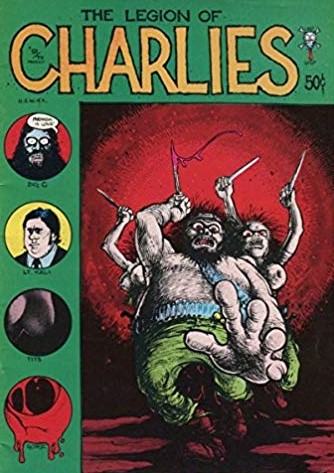 By TOM VEITCH, GREG IRONS, DAVE SHERIDAN (Last Gasp; 1971)
By TOM VEITCH, GREG IRONS, DAVE SHERIDAN (Last Gasp; 1971)
This 36 page one-shot has been called “the greatest underground comic of all.” It’s certainly one of the most overtly political, beginning with reproductions of newspaper articles from March 30, 1971 about the sentencing of Charles Manson and his followers, who got the death penalty, and My Lai orchestrator William Calley, who was found guilty but freed by Richard Nixon. For good measure, the comic’s creators Tom Veitch and Greg Irons insert their own news story, headlined “Veitch and Irons Hold Press Conference,” outlining the comic’s aims: “We’re protesting a government that dehumanizes its citizens and makes robot killers out of them” in a “non-partisan work of imagination aimed toward a public catharsis.” There’s even a dedication to “The Brave Veterans who turned in Their Medals in Washington, D.C.”
There follow several split page depictions that further contrast the fates of Lieutenant “Kali” and “Charlie,” with the former receiving a medal and the latter strapped into the electric chair. The rest of the comic focuses on Kali, who heads to San Francisco and, after murdering a prostitute in a PSD fit, drops some acid and envisions an undead Charlie. Kali is drawn by the vision to a gathering in the mountains of Utah, where his allegiance to Charlie is forged in an orgy of sex and cannibalism. This is the start of a worldwide orgy of murder and cannibalism orchestrated by Charlie’s followers that climaxes with Kali and his chums being feted by President Nixon—who doesn’t last long against what, as the final lines inform us, is “but an allegory of the death which will eat us all!”
Following the comic is a four page textual account with sparse illustrations entitled “The Conversion of President Nixnerk.” It tells of how the Pres. attempts to get rid of the legion of Charlies just as they become cultural heroes, inspiring a nationwide cannibalism fad. Inevitably the president is kidnapped by the Charlies and devoured (in what amounts to an alternate ending).
The superlatives heaped on this comic were a bit much. A timely political message will always earn a book/song/movie extra points with contemporary critics, and that certainly seems to have been the case with this overwrought piece of work, which promotes satire of the most broad and ham-fisted variety (as when the severed head of Vice President Spiro Agnew lands in a restaurant, with a diner commenting that “Well, the new left won’t have to worry about him becoming president!”). Yet it must be admitted that THE LEGION OF CHARLIES has a fire and ferocity unusual in underground comics, which even at their most political tend to be aloof and disaffected. Not so with this comic, whose approach is blunt and confrontational, with highly extroverted artwork in which bulging eyeballs, explosions and splattered blood predominate.
